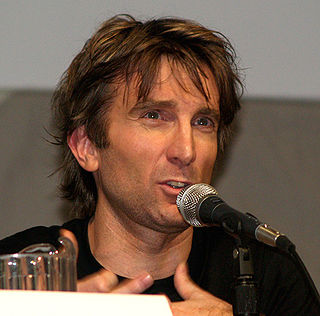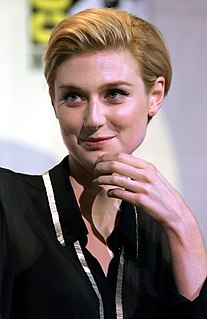A Quote by Megan Smith
It's a mistake to get too narrow too fast. Kids today, many of them will live past 100, and you cant predict what you might work on. The things you're passionate about and interested in, get experience with them by going deep on projects. I would encourage science projects, plays. Pursue science, math, writing, history - the 21st century demands a lot of cross-disciplinary thinking.
Related Quotes
Too many younger people seem to prefer following celebrities instead of doing the work required to get an education that will someday lead to a job. If students today spent as much time on math and science and history as they do following these shallow celebrities, they might actually become contributors to society someday.
Literary science fiction is a very, very narrow band of the publishing business. I love science fiction in more of a pop-culture sense. And by the way, the line between science fiction and reality has blurred a lot in my life doing deep ocean expeditions and working on actual space projects and so on. So I tend to be more fascinated by the reality of the science-fiction world in which we live.
I'm not interested in going to casting after casting, trying to get into that game. So there is a part of me that knows that I will do more characters, even if I have to produce those projects myself to get those projects out there. If the right characters come along, I would love to. I would jump at the chance.
Science is like society and trade, in resting at bottom upon a basis of faith. There are some things here, too, that we can not prove, otherwise there would be nothing we can prove. Science is busy with the hither-end of things, not the thither-end. It is a mistake to contrast religion and science in this respect, and to think of religion as taking everything for granted, and science as doing only clean work, and having all the loose ends gathered up and tucked in. We never reach the roots of things in science more than in religion.
Science talks about very simple things, and asks hard questions about them. As soon as things become too complex, science can't deal with them... But it's a complicated matter: Science studies what's at the edge of understanding, and what's at the edge of understanding is usually fairly simple. And it rarely reaches human affairs. Human affairs are way too complicated.
Like many others, I have deep misgivings about the state of education in the United States. Too many of our students fail to graduate from high school with the basic skills they will need to succeed in the 21st Century economy, much less prepared for the rigors of college and career. Although our top universities continue to rank among the best in the world, too few American students are pursuing degrees in science and technology. Compounding this problem is our failure to provide sufficient training for those already in the workforce.
I would teach how science works as much as I would teach what science knows. I would assert (given that essentially, everyone will learn to read) that science literacy is the most important kind of literacy they can take into the 21st century. I would undervalue grades based on knowing things and find ways to reward curiosity. In the end, it's the people who are curious who change the world.
It is time to create new social science departments that reflect the breadth and complexity of the problems we face as well as the novelty of 21st-century science. These would include departments of biosocial science, network science, neuroeconomics, behavioral genetics and computational social science.


































